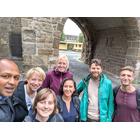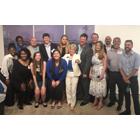From the December 2019 Desktop News | It may be getting colder, but it’s already time to start thinking about the summer. With so many internship, study abroad, research, work and other opportunities available to students, it can be stressful to think about the summer ahead. Experiential Learning Services is here to help students navigate the various options that await them this summer.
Pam Derrick, director of Experiential Learning, says that students shouldn’t discount any opportunities they come across while searching for an internship. There are internships available in every industry and every location imaginable—everywhere from New York to Montana to your hometown. The best way to find out about these internships? Ask.
“Talk to your professors, and see what they suggest,” Derrick said. “Talk to your parents, to your parents’ friends, people you know from other organizations. Adults love to help college students, especially a student they have a personal connection with. So work on your elevator pitch and be able to use it.”

Mathew Cieśla, a sophomore studying neurolinguistics and German, received his dream internship after talking to a lecturer during a visit to Germany. Because he asked, he earned an internship with the Juelich Research Center (Forschungszentrum Jülich), Institute for Neuroscience and Medicine, in Jülich, Germany.
“I actually met Dr. Paola Mengotti from the Juelich Research Center during a conference on Language and Cognition in Cologne, Germany earlier this year,” Cieśla said. “Afterwards, I spoke with her for a few minutes about it, and I asked her if her institute offered internships. To my surprise, she got back to me a couple of weeks later and informed me that her lab would be happy to host me.”
Sometimes, just a quick chat, a phone call, or an email will be enough to show potential employers your passion and interest in their area of expertise. But for those who don’t necessarily know what they want to do or what opportunities are available, Derrick suggests using networking events and websites like Handshake and LinkedIn to find other opportunities that may better fit your needs. Jonah Gray, a junior majoring in political science, met his internship supervisor at a networking event in Tuscaloosa, landing him a gig at the district court in downtown Tuscaloosa.
“If I had never gone to that event on campus, I wouldn’t have met the judge that I worked for,” Gray said. “You have to go actually meet these people and let them know who you are. They’re not going to come up and meet you, so you’ll have to go to them.”
Once you’ve found an internship you want to apply for, Derrick recommends using the University’s resources to their fullest extent. Attend mock interviews and resume reviews at the Career Center, talk to your professors and classmates about what you might expect in the interview and internship as a whole, and ask Experiential Learning about stipends, housing, and other miscellaneous issues that may not come up in the interview. Cieśla explained that it’s not only important to set expectations for yourself, but for your employer and the University, as well.
“Make sure that you have clear expectations for what you want to learn or gain from the internship,” Cieśla said. “In my experience, those hosting the internship are genuinely interested in sharing their knowledge with you and want to make sure you learn everything you want. You’ll get so much more out of the experience if you have those clearly defined and your host will know exactly what to plan for your time there.”

Students considering summer internships should also ask about class credit. David Siegel, a senior studying political science and communications, found his internship with the Florida Democratic Party with a Google search. After looking through several internships, he learned that this internship was eligible for class credit, and decided to take it in order to fulfill a course requirement while learning from experts in his chosen career path.
“After speaking with the internship coordinator, I learned about the communications program that allowed me to work directly with the communications team of the party,” Siegel said. “As a political science major and communications minor, this really caught my attention. Another reason why I decided to apply was because this internship was eligible for the internship class the University offers, and I was able to receive course credit for my work.”
Excited for an internship, but having a difficult time finding funding? Many Arts and Sciences departments offer small grants and scholarships specifically for internships. The Levitetz Leadership Program, housed in New College, also offers scholarships to help fund unpaid internships so that students can focus on their internship instead of financial worries.

By setting these expectations and planning out your experience, you can spend your internship focused on getting the most out of your experience. Miranda Shapiro, a senior studying music performance and Russian, spent her summer performing with the Russian Opera Workshop in Philadelphia, PA. Throughout her experience, she was able to perform alongside some of the most brilliant people in her field—something she used to her advantage.
“You should ask questions,” Shapiro said. “This was a once-in-a-lifetime chance to learn from some of the most intelligent people in my field, and I should have taken more time to get to know them and find out just what it is they did to become so successful. All the same, I learned a lot from them. The coaches at the workshop gave me some excellent advice that has improved my singing and acting, and I made some great friends in the program.”
Whatever opportunities may arise, Experiential Learning is here to help you navigate them. For more information or help with internship, study abroad, or research opportunities, email Pam Derrick at pamela.w.derrick@ua.edu or visit experientiallearning.as.ua.edu.